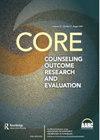有或无慢性疾病个体关系教育后痛苦差异的相关研究
引用次数: 1
摘要
人际关系质量有助于健康;相反,慢性关系压力会加重慢性疾病的症状。以个体为导向的关系教育(RE)是一种改善个体和关系困扰的有效干预手段。我们使用来自社区有效性研究的辅助数据集,并应用相关研究设计,采用1组前测后测设计来检查RE干预后的痛苦变化。样本(N = 672)主要包括有或没有CI的低收入、少数民族个体。在收入控制下,CI个体在入组基线时报告了更高的痛苦。re干预后两组患者的痛苦程度均有显著改善,Wilks’s λ = 0.93, F(1,669) = 79.49, p <。001, η 2 = .08;然而,没有任何一组受益更多。结果支持进一步检查CI患者在re后的痛苦和健康变化。辅导员可以使用以个人为导向的RE干预来帮助减少痛苦,并对整体健康干预做出贡献。本文章由计算机程序翻译,如有差异,请以英文原文为准。
Correlational Study of Differences in Distress Following Relationship Education for Individuals With or Without Chronic Illness
Abstract Relationship quality contributes to favorable health; and conversely, chronic relational stress exacerbates symptoms of chronic illness (CI). Individual-oriented relationship education (RE) demonstrates promise as an efficacious intervention to improve individual and relational distress. We used a secondary data set from a community effectiveness study and applied a correlational research design to examine changes in distress following an RE intervention with a 1-group pretest–posttest design. The sample (N = 672) predominantly included low-income, ethnic minority individuals, either with CI or without. Controlling for income, CI individuals reported higher distress at enrollment baseline. Both groups showed significant improvements in distress post-RE intervention, Wilks’s λ = .93, F(1, 669) = 79.49, p < .001, η 2 = .08; however, no group benefited more. Results support further examination of changes in distress and health post-RE for individuals with CI. Counselors could use individual-oriented RE intervention to help reduce distress and as a contribution to holistic health intervention.
求助全文
通过发布文献求助,成功后即可免费获取论文全文。
去求助
来源期刊

Counseling Outcome Research and Evaluation
Psychology-Psychology (all)
CiteScore
4.50
自引率
0.00%
发文量
11
期刊介绍:
Counseling Outcome Research and Evaluation (CORE) provides counselor educators, researchers, educators, and other mental health practitioners with outcome research and program evaluation practices for work with individuals across the lifespan. It addresses topics such as: treatment efficacy, clinical diagnosis, program evaluation, research design, outcome measure reviews. This journal also serves to address ethical, legal, and cultural concerns in the assessment of dependent variables, implementation of clinical interventions, and outcome research. Manuscripts typically fall into one of the following categories: Counseling Outcome Research: Treatment efficacy and effectiveness of mental health, school, addictions, rehabilitation, family, and college counseling interventions across the lifespan as reported in clinical trials, single-case research designs, single-group designs, and multi- or mixed-method designs.
 求助内容:
求助内容: 应助结果提醒方式:
应助结果提醒方式:


